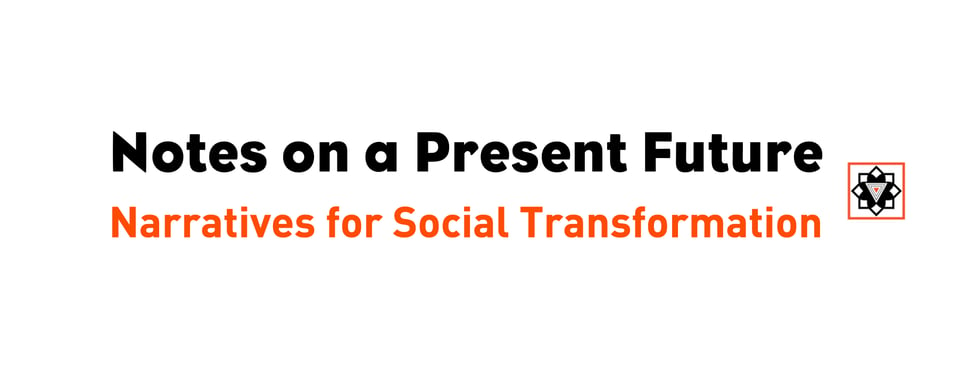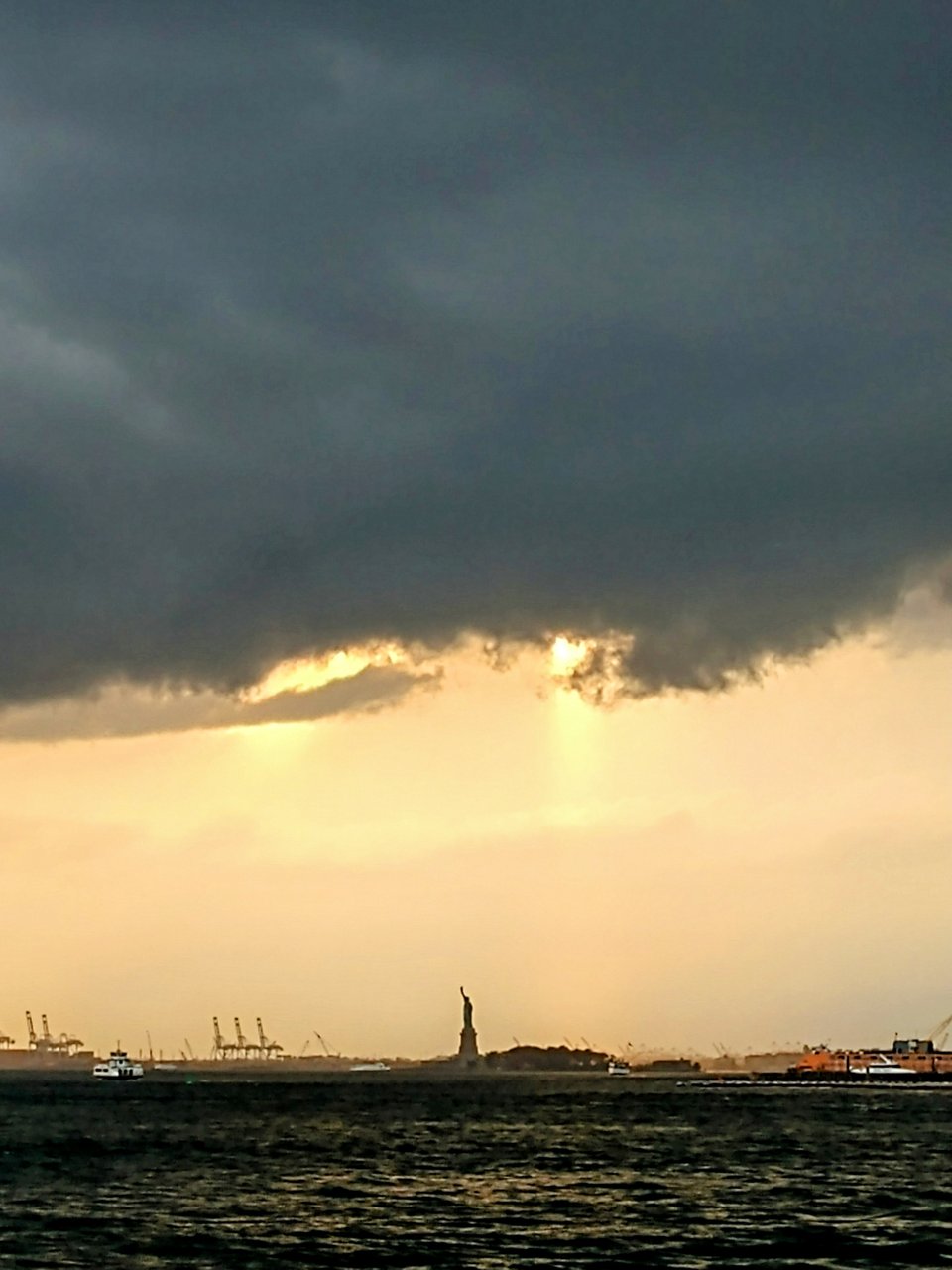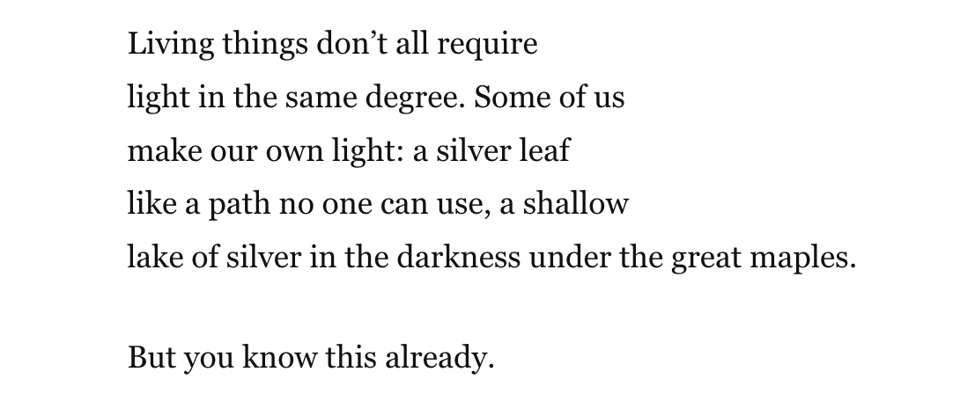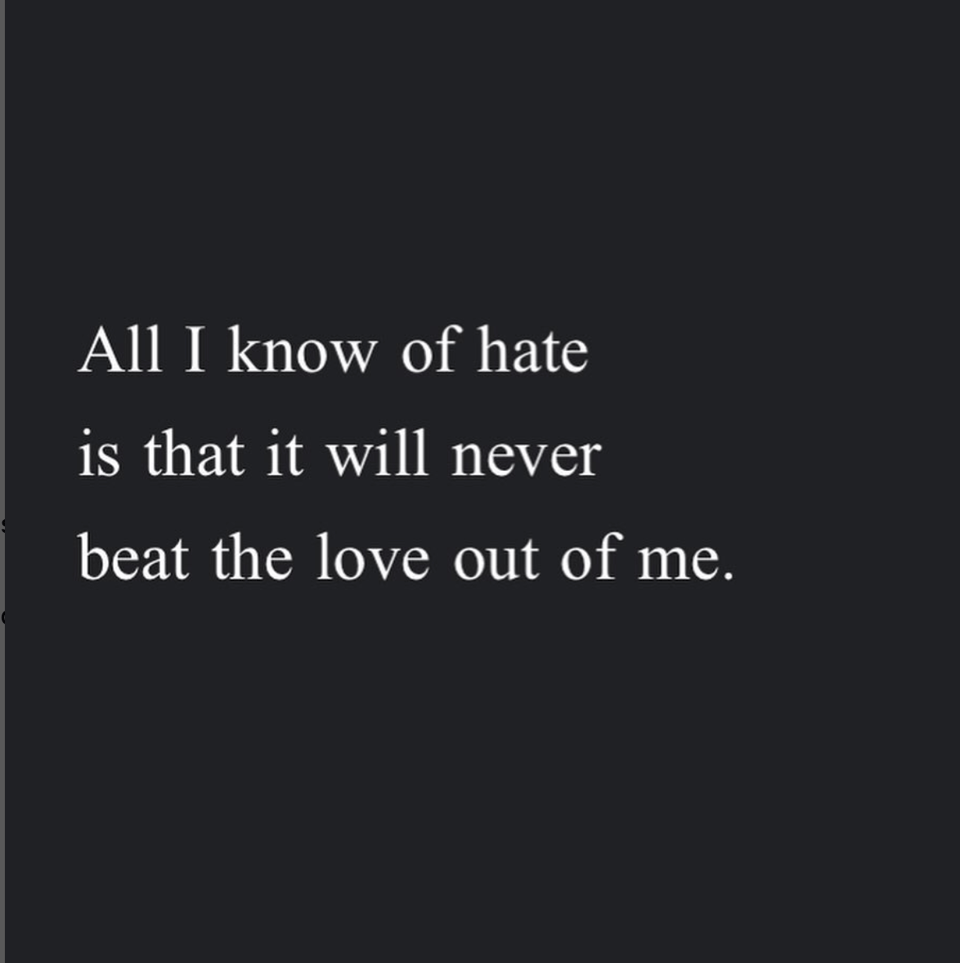Making Our Own Light

Summer 2025 edition
Welcome back to Notes on a Present Future. If this is your first time here, this is a long-form newsletter that uplifts the stories and work of people shaping the world to build just futures now.

What’s inside
1. A note from my desk
2. Updates (mine and, more importantly, yours)
3. Reading, watching, listening
4. Stay in touch and collaborate with us.
A note from my desk
I took a break from writing this newsletter these last months. The generative reason for this is that I’ve been focused on a small but meaningful portfolio of projects on power, narrative, and community in the rights and aid sectors, which have been besieged this year by rapid and massive upheaval. The other reason, though, is that the background buzz of horror and sadness and anger at the ongoing implosions and collapses of our systems had stopped my words for a little while.
Those of us from affected communities or who work in the social sectors are being thrown between cognitive dissonance and hypernormalization: Every day, I have conversations with friends and colleagues about the whiplash from trying to live our lives and attend to mundane tasks – and hopefully even make time for joy and rest – while living through institutionalized and weaponized xenophobia, the fall of international humanitarian law and humanitarian aid, and the rise of authoritarians. There are some bright spots, like watching Zohran Mamdani’s smile sweep the New York City Democratic mayoral primary. But even that has a dark side in the backlash he is facing. And every day we are experiencing climate tragedies, genocide, and detentions and disappearances, and watching these unfold on our screens in real time. On top of this, many of us in the social sectors are dealing with economic anxiety and threats to our work because of the massive retrenchment of funding, spiking our nervous systems into fight-or-flight.
With this as our daily context, the work of rights advocacy, sensemaking, and culture shaping has become… difficult.
I founded CfTC with a mission of building beyond this political moment through narrative power, collective leadership, and political hope. In the current dark reordering of the world, it still feels like these frames are the right ones for our little Center. We are trying to animate our work with these values in mind, and to collaborate with organizations and communities that are pulling toward the same goal of the collective good. Over the past few months, we’ve focused on projects that center power shift through lived experience: We are working, for example, with a network of refugee rights organizations addressing meaningful refugee participation. We developed a new framework on Narrative Infrastructure to support collective storytelling and the narrative power of communities. And we're producing a new body of research and stories on what leadership looks like when it leads to social and cultural transformation.
This work is meaningful, and even now, in the midst of collapse, it can be fun and joyful. We are hopefully contributing to deepened collaborative relationships and sparks of ideas for how we move beyond this moment. The key question I’m asking about our work right now is how to find the resources to sustain it over the long haul and to connect it to others into a strengthened mesh of ongoing collaboration. Many of the conversations I’m having with friends in the social sectors are about this. I don't think we have the answers yet. But I believe this work is crucial – and I want to keep doing it.
Still, there are days when it is so hard to hold on to hope, and these days might call for us to pause—to reflect, repair, and prepare. When everything feels urgent, slowing down can be an act of care and wisdom. But we can't retreat because of despair.
I keep reminding myself of this. Since Louise Glück’s passing in October 2023, I have returned repeatedly to a section of her poem “Lamium.”

I keep rereading the line “Some of us / make our own light”. Because that’s a challenge today, isn’t it? To generate light from within, from beneath dark cover, even when the world seems determined to extinguish it?
The most difficult and courageous creative work of our time may be this: To hold the darkness and uncertainties of our present moment while building a practice rooted in hope and joy of imagining new systems. To face where we are and stay present, for ourselves and for all those people around the world who are increasingly at risk because of climate, displacement, poverty, and oppression, while still shaping what is possible in our shared future. And to create light from the shadows for a world that desperately needs it. But you know this already.
Now, to the updates…
Updates
Mine:
Power Shift I’ve been moderating the podcast Power Shift, a co-production between The New Humanitarian and CfTC. The podcast asks what it really means to shift power in the humanitarian system—beyond high-level commitments—to the realities on the ground. This is one of my favorite CfTC projects of the last few years, and I wrote about why I did this project in an essay for TNH here. Please listen wherever you get your podcasts.
Celebrating anniversaries: I’ve been honored to serve as an advisor to two amazing organizations over the past few years which are both celebrating 10th anniversaries this year:
Brown Girls Doc Mafia is a global, multilingual, and multiracial network of BIPOC women and nonbinary filmmakers and industry professionals confronting inequity in the film industry by nurturing, amplifying, and investing in the creative capacity and professional success of members. Their programs are fantastic – for example, they recently announced the recipients of their latest fellowship, the 2025 Sustainable Artist Fellows – and deserve lauds and support. I’ve been a proud member since BGDM’s founding and a member of the Capacity Council for around a year. Please get in touch if you want to know more.
Electric South collaborates with and supports artists throughout the African continent to build a robust storytelling ecosystem in Africa, grounded in immersive and interactive technologies. One of their newest projects is Futures_Past, a new initiative in partnership with the French Institute of South Africa using VR, AR, and immersive storytelling to reimagine heritage collections and bring archives to life across South Africa, Lesotho, and Malawi. The organization’s research and programming is joyful, creative, and essential to supporting new models of creativity and income. I’ve been a member of the board of directors for nine years and I love this work.
Changemakers Authors Cohort I was thrilled to be accepted into the Changemakers Authors Cohort, a joint program of the Unicorn Authors Club and the Narrative Initiative, which works with changemakers on creating books that catalyze narrative change. (Yes, I’m working on a book – you’ll hear about that someday.) The staff and the methodology of their programming is truly excellent, some of the best I’ve ever experienced. I started in the cohort in March and – along with my ongoing work with poet and writing coach Tara Skurtu – it’s already transformed my writing process. If you have a book in you that will shift frames in our roiling world, apply next year, or join one of their ongoing programs.
New writing. Earlier this year, I started a practice of writing micro essays that explore political hope in 500 words or less, with little to no editing. Just a practice of sit, write, post. It’s a challenging format, but it’s been rewarding – a different way of using my writing muscles – and I’ve written 12 over the last 5 months. I’m going to try to get to 24 by year’s end. Just because. I also posted a longer form essay to my Medium page about Zohran Mamdani’s campaign for NYC mayor. I don't center electoral politics in my work, but Mamdani's commitment to collaborative action captivated me. So I wrote about it.
Stand Up for Madinah: I executive produced this short documentary by Zainab Sultan about Delaware’s first Muslim woman state legislator, Madinah Wilson-Anton. Madinah successfully led the State House to a Gaza ceasefire resolution, while also working as a stand-up comedian. I came on board because Zainab is a filmmaker to watch, and because I find Madinah’s balance of politics and comedy so intriguing, especially now, especially when Black and brown women are navigating power and participation in the public square at a time of political backlash. The film was released in November by Al Jazeera Witness and the filmmakers are doing community screenings now.
Yours:
For those of you interested in ethical technology
Greg Lindsay's report "The Augmented City" examines how augmented reality could transform urban spaces with interactive data and enhanced accessibility, while warning that without proper regulation, AR risks fragmenting public spaces, eroding privacy, and deepening social divides.
When "Ethical AI" Falls Short Lighthouse Reports' investigation reveals how Amsterdam's "fair" welfare fraud detection system failed despite following every Responsible AI best practice. The city debiased algorithms, consulted experts, and involved welfare recipients in design—yet the system remained biased and ineffective. After years and hundreds of thousands of euros, officials scrapped the project entirely. This rare look inside a Responsible AI system raises fundamental questions about whether some AI applications can ever be truly ethical.
MERL Tech's Natural Language Processing Community of Practice brought together over 90 professionals from humanitarian and development sectors to tackle the pressing question: "Should we be using AI right now?" The conversation revealed growing concerns about AI being pushed as a "magical solution" despite rollbacks in safety regulations and connections to authoritarianism, with a majority of participants rethinking their AI use amid challenges finding ethical alternatives to mainstream tools.
Baratunde Thurston’s podcast Life With Machines recently featured Sam Gregory, Executive Director of WITNESS. Sam is a leading expert on AI and human rights. The conversation explored how AI-generated media is forcing people to constantly question reality, and the psychological toll of living in a world where even experts get fooled. Sam, who has documented injustice since the Rodney King video, discussed the human cost of an era where truth unfortunately now must be earned rather than assumed.
Documented, a collaboration with the International Rescue Committee and Signpost, has launched Documented.info , a new community engagement and information platform to support immigrants in NY. The platform offers 500+ guides and resources in English, Spanish, French, and Haitian Kreyol, with multilingual journalists providing personal responses to questions. The initiative shares monthly summaries of hundreds of inquiries and creates new resources accordingly.
For those of you interested in international development, human rights, and global affairs
The Friedrich Ebert Stiftung released Who Can Lead in a Disarrayed World?, new analysis by Professor Anjali Dayal (who is my niece; proud auntie alert). The report examines the upcoming 2026 UN Secretary-General selection process, which will choose António Guterres' successor amid growing global divisions and challenges to multilateralism. With the selection process expected to begin in late 2025 for a term starting January 1, 2027, the report addresses urgent questions about leadership and direction as the UN faces mounting pressure.
Bond has released "Transformations through Locally Led Development," highlighting localization efforts by UK-based international NGOs. Building on their 2022 guide for becoming locally led and anti-racist, the report showcases organizations taking different approaches to shift power and become empathetic allies to local partners.
Michael Solis, partnering with Trócaire and local organizations in Honduras, has developed "From Donor Phase-Out to Local Resilience"—a case study examining how thoughtful, locally led approaches help civil society organizations navigate donor exits and build long-term resilience. The study offers practical lessons and recommendations for sustainable transitions based on the Swiss Agency for Development and Cooperation's exit from Honduras.
Our colleague Aarathi Krishnan, Founder and Executive Director of RAKSHA, has launched The Sentinel—a publication aimed at delivering strategic, informed insights on global risks and opportunities and helping decision-makers understand the interconnected forces shaping our world—from geopolitical shifts to climate impacts—so they can anticipate change, not just react to it.
For those of you interested in philanthropy
Earlier this year, Lucy Bernolz released the 16th edition of Philanthropy and Digital Civil Society: Blueprint 2025, the annual forecast on using philanthropy for public benefit in the digital age and highlighting trends, ideas, and expected breakthroughs in tech-enabled philanthropy. This is essential reading for digital civil society and social change folks. I was honored to host a conversation with her a few months ago, and I hope to continue working with her on dialogue and network weaving around these topics. In the meantime, while this was the last edition issued in partnership with Stanford University, Lucy will keep the Blueprint alive in a renewed form, and PACS, and is currently publishing insights at her website.
Jennifer Thuy Vi Nguyen has launched Philanthropy Confidential, a new series that almost feels like an advice column, to answer questions about philanthropy. Published with the Stupski Foundation, the series’ inaugural piece explores why foundations struggle with "unbound generosity" and examines the bureaucratic gatekeeping that slows grants to a crawl. Good questions.
Sandy Herz has also launched a new series called The Elephant and the Butterfly, which documents insights and responses to sector collapse across media, social impact, and philanthropy. Her piece “The Billion Dollar Question” challenges philanthropy's conservative approach to spending, despite mounting evidence that aggressive giving strategies can work.
Mandy Van Deven has launched a new feature series with the Center for Effective Philanthropy called The Myths of Philanthropy: What If We Change the Narratives That Govern the Philanthropic Sector? The series examines how philanthropy often undermines its own goals through embedded narratives like individualism, competition, and scarcity, and showcases alternative approaches that can help funders become better partners in creating just futures.
Alisha Bhagat of Forum for the Future announced the launch of "Forging Futures: A Strategic Decision-Making Game for Resilient Societies" with Rockefeller Philanthropy Advisors. The game aims to strengthen long-term strategies, practice strategic decision-making under uncertainty, and develop futures-focused thinking, through a combination of role-playing, storytelling, and futurism to help philanthropic organizations. The goal is to help philanthropic organizations move beyond reactive approaches toward transformative solutions.
For those of you interested in new economic and organizational models
Aunnie Patton Power has launched the Innovative Finance Initiative (IFI), a five-year effort to scale high-impact funding models and advance innovative finance. With input from over 400 contributors, IFI creates space for funders, founders, and field builders to learn, explore new possibilities, and co-build tools for the field.
Transform Finance published insights on how Alternative Ownership Enterprise models are using innovative ownership structures to share economic value and decision-making. This work spotlights how these models are shifting value and power in businesses worldwide.
I love the way this new creative collective introduced itself: “Looking for the punk rock, open-source, zine-making technologists building toward something better? Meet (m)otherboard—a creative collective reimagining tech in service of life, community, and the collective good.” Founded by Aden Van Noppen, Coraline Ada Ehmke, Emily Best, Jenifer R.D., and Sara M. Watson, (m)otherboard aims to collective care and radical creativity to tech, you're in the right place.
Carla Murphy and collaborators launched News Futures, a network of journalists, organizers, educators, and public servants working together to reimagine local news, focusing on building community infrastructure, a commitment to reparative practices, and investment in cross-sector collaboration.
Marta Foresti recently launched the LAGO Collective on Migration, Culture and the Arts, a research and creative collective focused on changing the narrative around global migration (near and dear to my heart). The organization creates projects, products, and collaborative events that bridge arts, design, research, and policy-making; works with cities to develop tangible solutions for migration challenges; and stewards communities of action across borders and sectors. A recent fascinating project, for example, focuses on the poetics of visa inequality.
For those of you interested in creative economies and the arts
The Documentary Producers Alliance has launched a comprehensive Ethics Resource Library featuring vetted resources on consent, participant safety, labor practices, and representation. This living collection helps filmmakers navigate ethical challenges at every stage of production with articles, toolkits, and guidelines.
Mahyad Tousi has published a new manifesto through Starfish, calling for a fundamental reimagining of how we support artists in crisis. Rather than propping up failing legacy systems, Mahyad argues for cultivating new ecosystems where artists retain ownership, build direct community relationships, and achieve sustainability outside extractive models through seed grants, regenerative funding, and peer support networks.
Liz Rosenthal announced the release of the second Venice Immersive Think Tank report, authored by Kent Bye and edited by Michel Reilhac, on immersive content distribution and exhibition. The report features key insights on the location-based entertainment market from stakeholders who gathered during the 81st Venice International Film Festival.
The Documentary Accountability Working Group (DAWG) is set to launch a new syllabus, "From Reflection to Release: Framework for Values, Ethics, and Accountability in Nonfiction Filmmaking." Your can join the release event to learn how this resource supports ethical documentary practices.
For those of you interested in storytelling and narrative change
From frequent partners The New Humanitarian, the Lebanon Displacement Diaries is a participatory storytelling series centering the voices of people uprooted by last year’s war in southern Lebanon – a conflict that displaced nearly a million and still prevents tens of thousands from returning home. Through diary-style entries, photos, and video, they offer an intimate, multilingual look at what it really means to flee home – and how life continues long after the headlines of war move on. It's a beautiful project, published in Arabic and English, with illustrations by Lebanese artist Sasha Haddad.
The BLIS Collective launched their first research paper, Fabric of Repair: The Impact of Braiding Narratives of Reparations and Land Back on Black and Indigenous Audiences, on solidarity messaging effectiveness. Their key findings show strong cross-movement support and that braided narratives increase backing for both causes. Most critically, they identified the "Hope Gap"—while respondents support the movements, very few believe these goals are achievable, revealing where movements lose momentum and narrative work must focus.
Aisha Fukushima has a new podcast out, Future of the Present. The latest episode features Akemi Kochiyama-Ladson—Harlem-based writer, scholar-activist, and co-director of the Yuri Kochiyama Solidarity Project – who shares insights on collective memory, justice, and radical solidarity.
Francesca Cavallo, co-author of the bestselling "Rebel Girls" series, released Stellar Stories for Boys of the Future, illustrated stories that challenge traditional masculinity by moving beyond the Prince Charming archetype. The book, which has a companion blog, helps boys explore self-acceptance, friendship, and consent while breaking free from the narrative that men must save others because they can't save themselves. If you have boys and young men in your life, pick this up.
From Trina Dasgupta at Single Palm Tree Productions came Reflections2020. a public art installation to process the pandemic for COVID's fifth anniversary. She invited New Yorkers to share their pandemic experiences while speaking to a two-way mirror. This intimate storytelling project explores how we've all changed since 2020. I was lucky to see the exhibit at the City Lore Gallery in NYC, and parts are now on their Instagram account. As one participant noted, "The world changed, but so did we."
Reading, watching, listening
What I’m reading:
Ruha Benjamin’s Imagination is a beautiful invitation to open up our minds to the possibilities of just futures grounded in justice and dreaming.
Rebecca Solnit’s book of essays No Straight Road Takes You There is an invitation to consider liberation through uncertainty and adaptation.
Imani Perry’s book Black in Blues constructs and reconstructs the history of Blackness through the color blue, and it’s endlessly fascinating and emotional.
I’ve been seeking out readings scrutinizing the humanitarian aid system at a time of its collapse. There is a lot to take in. The rapid shifts and dismantling of the humanitarian aid system have sparked a surge of critical scholarship questioning its fundamental effectiveness. Recent analyses include arguments, for example, that stopping refugee aid in Uganda altogether might force genuine integration over dependency, calls for centering refugee-led organizations in humanitarian reset efforts after being sidelined by agencies and donors, proposals for restructuring foreign aid around debt relief rather than traditional assistance, and critiques of how privatized humanitarian systems in Gaza led to deaths and minimal aid delivery despite massive spending. This growing body of work reflects a field grappling with how to move beyond the present moment and overhaul the current system.
Lately I’ve been getting a weekly dose of foreign policy and international affairs reading from a number of sources, including via Interruptr from Elmira Bayrasli; Systemic Hatreds from Paul Musgrave; and Dispatches from a Collapsing State from Jared Yates Sexton. (Come back next time for more recommendations.)
What I’m watching:
A while back, Linda Raftree and I used to run a community called Regarding Humanity, which was aimed at ethical storytelling and design in the aid/dev and social impact sectors, grounded in frames of decolonization, anti-racism, and local voice and agency. Through that work, we met Cassandra Herrman, who was working on a film about related topics called When I Say Africa. Featuring insights from writer Binyavanga Wainaina, educator Zine Magubane, and photojournalist Boniface Mwangi, the film explores how Western portrayals of Africa have been shaped over time and examines the power structures behind these representations. This is a great film to watch with students and young changemakers.
I’ve watched this piece of choreography by Shay Latokolan to one of my favorite Latin jazz tunes on repeat a few times. I need the whole song.
My friend and colleague Elaine McMillion Sheldon made this lovely music video for Snapping Turtle from S.G. Goodman's album 'Planting by the Signs.”
The binges lately have been Dept Q., Grantchester, The Residence, Kleo, Lidia Poët, Doctor Who, and my favorite of the year, Andor.
What I’m listening to:
When I need to move, I can’t get enough of Little Simz, Pahua, or Joy Crookes. Or of Four Tet.
When I need to sink into calm and what Hildegard von Bingen, the canonized German nun and mystic polymath born in 1098, called viriditas – the fecund, wet, greening power of life – I listen to von Bingen or to Ghalia Benali.
When I need inspiration, it’s Las Cafeteras with Caravana for all our immigrant families.
See you this Autumn.
In solidarity and joy,
Lina
To work with us: Center for Transformational Change
We specialize in strategy, research, convening, and original productions related to community leadership for social transformation across displacement, climate justice, equity, and cultural engagement.
To book me for speaking: My Chartwell Speakers Profile
To learn more about my work: www.linasrivastava.com
To support this newsletter, please visit this link and send it to your friends.
To ask to amplify your social transformation project, please email here
To reach me on social media: LinkedIn, Bluesky, Instagram.
P.S. A thought from Andrea Gibson, who we lost this week:

You are on this list as a member of my community. If you would like to change how you receive this newsletter: Update your preferences or Unsubscribe from this list below.
Copyright 2025, Lina Srivastava. All rights reserved.